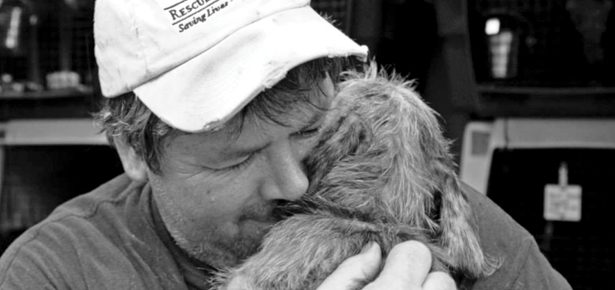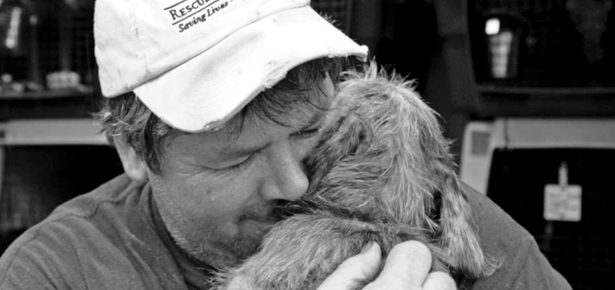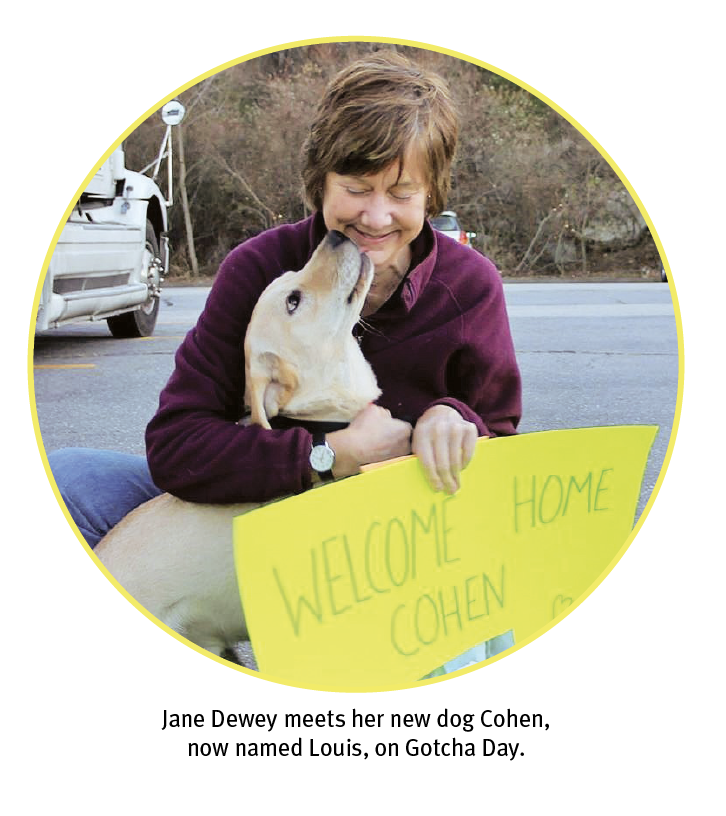

Rescue Road
One man, thirty thousand dogs, and a million miles on the last hope highway
As Greg Mahle, unshaven and road weary, pulls his 12-wheeled rig into a parking lot in Putnam, Connecticut on a sunny Saturday afternoon, he peers through the grime of nearly 3,500 miles that has collected on his windshield since we left his home in Zanesville, Ohio five days ago. In front of us are a couple of dozen people, many of them children, clapping and waving signs of welcome. It’s a scene Mahle has witnessed here almost every other Saturday for the past ten years.
His cargo? Approximately eighty lucky rescue dogs—dogs once lost, abandoned, neglected, or abused; many just hours away from being put to death in high-kill shelters in southern states. Over the past five days Mahle, whose not-for-profit operation is called Rescue Road Trips, has driven from Ohio to Texas and along the Gulf Coast picking up dogs saved by various rescue organizations. The people waiting? “Forever” families ready to welcome their new loves into their home. This day, when dogs and their new families are united, is known as “Gotcha Day.”

guys for a while, but they’ve been waiting their whole lives for this moment!”
But before he does, Mahle sighs gently and turns to me. “You know, a few days ago these dogs were all going to die. Now, the doors will open, the light will pour in, and each one will be delivered into the arms of a loving family. This is heaven.”
I first learned of Greg Mahle in 2012 when, after a twenty year “discussion” with my wife and children, I finally agreed to get a family dog. When we adopted a yellow Lab mix named Albie, it was Greg Mahle who brought him north from Louisiana. Albie had languished in a public shelter in Alexandria for five months, very fortunate to survive. About nine in ten dogs who end up there never leave; they are euthanized, to put it politely. The south, simply put, has a massive canine overpopulation problem, but there is demand for rescue dogs up north.
I was intrigued by Mahle’s bi-monthly odyssey and persuaded him to let me tag along. I also spent time with some of the tireless people who save these dogs, nurse them back to health, often at great expense, find them homes and bring them to Mahle’s truck to begin the final leg of their long journey home. These people see so much suffering that compassion fatigue can be an occupational hazard. For every dog they save there are thousands they cannot, and the faces of those left behind haunt them.

On a Wednesday morning in May, Mahle and I and his other driver “Tommy” started picking up dogs at designated meeting places. (“Tommy” prefers that I not use his real name.) By afternoon we had about fifty. In southwest Louisiana, we stopped at a service station with a large, grassy field nearby to give each dog a short walk, a job that has to be done in the brutal heat and humidity of a Southern summer and the bitter cold of a Northeast winter. As Mahle and I walked the dogs Tommy changed paper in the kennels and filled water bowls.
As we walked, I was struck by how physical Mahle’s work is. Tires need to be changed, roof-mounted air conditioning units checked, and the endless hours of driving a big rig are far more wearying than driving a car. Then there’s lifting dozens of dogs, some weighing eighty pounds or more, in and out of kennels, securing the leashes and sometimes being towed along by a large dog very happy to be free of his kennel so he can do his business. Some bounded down the stairs of the truck; some had to be handed down into our waiting arms. Zack, a mixed breed, seemed petrified as he climbed into my arms. Jenna, a black Lab, just rolled over, wanting a belly rub.

Mahle charges $185 to transport a dog. Expenses are high: fuel alone can run $7,000 or more per month, there are salaries to be paid (to Tommy, for example) and constant, costly, repairs among others. Mahle devotes upwards of 400 hours a month to his work; even when he’s not on the road, Rescue Road Trips is a more than full time job. When you do the math, he’s making less—often significantly less—than minimum wage, depending on how many dogs he has on a run.
By the time Mahle pointed the truck north we had more than 80 dogs on board. The longest stretch of driving is from central Louisiana virtually non-stop through the night to Allentown, Pennsylvania where Mahle arrives every other Friday evening. But on Thursday evening, outside of Birmingham, we stopped for a few hours. Here Mahle’s “Birmingham Angels,” as he calls them, a group of some three-dozen volunteers, come and give each dog an extended walk and whole lot of love. Similar groups meet the truck in Allentown and Rocky Hill, Connecticut every other week.
As we rumbled north through Tennessee and Virginia, Mahle spoke frequently about the people in rescue whose faces adopters never see and whose names they may never know.
“We are all cogs in a wheel in rescue,” Mahle explained. “Everyone has a role to play. No one’s job is any more important than anyone else’s. It takes a hundred people playing their roles to save a dog.”
From the moment we left Zanesville on Monday—a bittersweet parting because Mahle adores his wife Adella and stepson Connor, 12—Mahle made frequent use of Facebook. He documents every rescue road trip, and posts dozens of pictures of the dogs along the way. For the eager and anxious families waiting down the line he wants the excitement to build as they follow their pups from the deep South to the North. He wants Gotcha Day to be unforgettable.
Mahle’s Facebook chronicles have another audience, too—the many people who extended hearts and hands to make each dog’s journey possible. They may never see a Gotcha Day in person but through Mahle’s posts they can share the joy and see the happy endings they helped make possible.
Mahle always writes a Facebook post after the truck crosses into Pennsylvania on Friday afternoons. “We have crossed the Mason-Dixon Line!” he wrote. “All bad memories of being homeless, starved, abused, abandoned, unwanted, and unloved are behind us. Our thoughts are on forever families and forever love. Gotcha Day is almost here. Are you excited? Is your welcome sign ready? Get ready, we are almost there!”
The next morning, inside the trailer, the start of Gotcha Day is marked by the sound of a single dog barking, then two, and then three. Soon you can hear the sound of wagging tails brushing against kennel walls, paws scratching at kennel doors, and an occasional whimper. The sounds build gradually, as the rising din stirs more dogs to wakefulness, until the trailer is alive with the sounds of eighty dogs on the threshold of new lives.
For Mahle, this is the day that makes the endless miles of blacktop, the long absences from home, the exhausting work and the burden of carrying so many people’s hopes and dreams on his shoulders worthwhile.
As we approach Putnam, I ask Mahle what it’s like for him at the end of Gotcha Day when, suddenly, the trailer is empty and quiet.
“It’s a difficult emotion to explain,” he says softly after a long pause. “I’m happy to be finished and excited to be going home to see Adella and Connor. But I don’t like going back in the trailer because the dogs are all gone. It’s lifeless and cold, plastic and metal. Right now, it’s full of life in its best form.”
“When the last dog is handed to his new family,” he adds, “I survey the panorama of people with their new dogs and think, I’ve never seen so many happy people. They’re all having the same experience and you can believe the world is a better place.”
This article was adapted from the New York Times bestselling book Rescue Road by Peter Zheutlin, published by Sourcebooks. If you’re looking for a great read, this truly heartwarming story about an extraordinary man helping to give thousands of dogs a second chance is it!
Join the newsletter and never miss out on dog content again!
"*" indicates required fields
By clicking the arrow, you agree to our web Terms of Use and Privacy & Cookie Policy. Easy unsubscribe links are provided in every email.